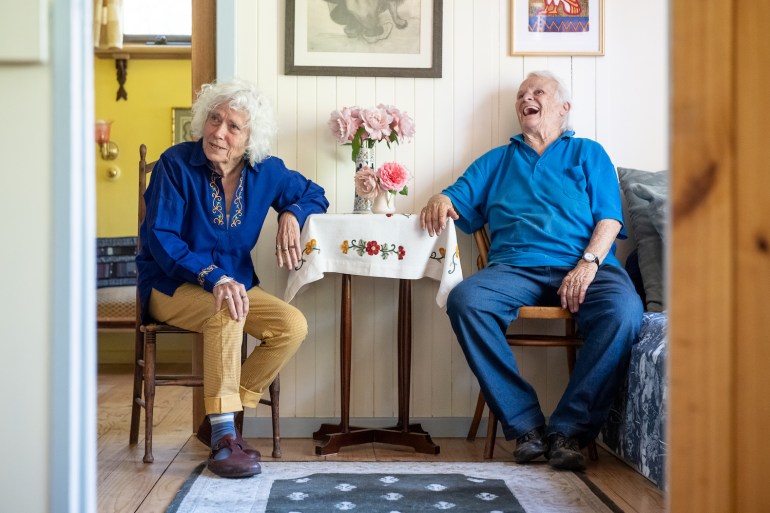South Australia’s Wallis Cinemas has launched a distribution arm, with its first acquisition Marion Pilowsky’s documentary Isla’s Way.
Steering the arm, to be known as Wallis Releasing, is programming manager David Simpson and programming executive Manda Flett.
Isla’s Way follows the 87-year-old bush mechanic and horse carriage driving champion Isla Roberts, who lives in the Adelaide Hills with her partner of 40 years, Susan. The straight shooting great-grandmother refuses to define her sexuality, insisting she is not a lesbian, though Susan is.
The film takes place over a year, with Pilowsky following Roberts as she returns to her remote marital home, attends her grandson’s wedding, welcomes the arrival of new great grandchildren and fights to keep carriage driving. Roberts also discusses her experiences of rural Australia, caring for a mentally ill husband, and raising a family in severe economic hardship.
The doc premiered at the Adelaide Film Festival last month to sold out sessions, with Wallis Releasing launching it theatrically in select cinemas from today. It is starting on more than 20 screens and expected to grow through word of mouth. There are holdbacks in Melbourne, where the film is playing the Melbourne Queer Film Festival and in Sydney, where it will screen at the Antenna Documentary Film Festival early next year.
Flett tells IF that Wallis’s move into distribution was an organic one that stems from Isla’s Way, rather than something that had necessarily been planned for the business.
The exhibitor has a long-standing relationship with the Adelaide Film Festival and Pilowsky and producer Georgia Humphreys’ company, Corner Table Productions – Flett, whose background is in production, was a script supervisor on Pilowsky’s The Flip Side.
Originally, the filmmakers had intended to self-distribute and asked the Wallis team for advice about dating. However, given how difficult it can be for Australian films to secure screens, let alone documentaries, it soon became clear that Wallis could leverage its relationships and help get Isla’s Way to a wider audience in an almost “farm to table” model.
“We know how hard it is for independent filmmakers to self-distribute, and we wanted to help them,” Flett says.
“We program films for so many independent cinemas in regional areas. When we saw the film, we could see immediately it speaks to regional audiences and in particular, older women in in regional areas. I felt that it would be a no brainer, because we already have a significant network of regional sites that we could tap into and offer the film to.”
Isla’s Way marks Pilowsky’s first feature documentary, having connected with Isla through her grandson, cinematographer David Roberts.
With an extensive background in sales and acquisitions, the first question the director asks before undertaking any project is: Is there an audience for this film? Now 60, she often feels older women are underserved and had suspected they – and others – would connect to the story about agency and “an extraordinary person living a very ordinary life.”
“What we’ve found out from our screenings is that there’s a huge appetite for it. The response from all the women has been really overwhelming. I’m quite surprised by it. Lots of tears. Laughter and tears, but the tears did surprise me. I guess it makes people think about their own mortality, what they’ve done in their life, what they’re capable of achieving, and what they might do. Isla gives you permission to take risks,” she tells IF.
In working with regional cinemas to release the film, Wallis has relaxed session policy and minimum guarantees, with Flett arguing they can often be prohibitive factors for such exhibitors in booking limited releases. With Wallis handling the “nuts and bolts” of booking cinemas, Pilowsky and Humphreys are then handling the PR and promotions alongside Tracey Mair of TM Publicity.
Flett says Wallis still doesn’t see itself as a “distributor” as such, rather as an exhibitor with a distribution arm.
“It was more about allowing Australian filmmakers to get their content out there into theatres and do it in a way that basically took out the middleman,” she says.
“We probably see ourselves more as facilitators rather than distributors. We’re using our knowledge and networks to assist independent filmmakers to get their stuff out there without it getting over complicated.”
In that sense, Wallis Releasing is not necessarily building a slate of films, but it is open to working with Australian filmmakers going forward, if the right film comes along.
“The brilliant thing about Marion and Georgia is that they were so proactive and willing to get on board with all the marketing,” Flett says.
“Working with highly motivated filmmakers has been the difference. In order for us to do it again, the filmmakers would have to be as motivated as Georgia and Marion have been and as willing to do the hard work, grassroots marketing that those two have done so well for this title.”


